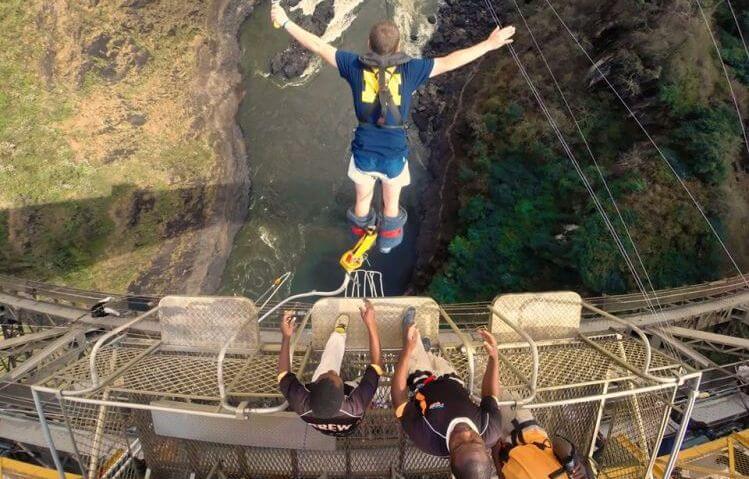Ditching the confines of solid ground for a heart-pounding drop into the open air is unquestionably thrilling. However, not everyone is suited to take on this ultimate adrenaline rush that is bungee jumping. From health considerations to age and weight restrictions, numerous factors can disqualify someone from participating in this high-intensity activity. Before making that heady decision to leap, let’s dive into who should refrain from bungee jumping and highlight key risks you need to be aware of.
While bungee jumping can be a thrilling experience, it is not suitable for everyone. Pregnant women, individuals with high blood pressure, heart conditions, circulatory conditions, back or neck injuries, and recent surgeries should avoid bungee jumping. Overweight individuals may also have weight restrictions when participating in this activity. It is important to consult with your doctor before attempting to participate in this extreme sport as serious injury and even death has occurred in the past.
High-risk Individuals for Bungee Jumping
Bungee jumping, with its exhilarating free-fall and heart-pounding rebound, may seem like an adventure that anyone can partake in. However, there are certain individuals who should exercise caution or altogether avoid this extreme activity due to the risks involved. Let’s dive into who these high-risk individuals are.
Consider a 45-year-old woman with a history of heart disease. While she may be enthusiastic about trying bungee jumping, her underlying condition puts her in the high-risk category. Engaging in activities that cause sudden and intense physical exertion can trigger heart palpitations, chest pain, or even cardiovascular events.
Individuals with pre-existing health conditions, such as high blood pressure, heart conditions, or circulatory disorders, need to approach bungee jumping with utmost caution. The intense gravitational forces experienced during the jump can lead to increased heart rate and blood pressure levels. This poses a substantial risk for arrhythmias, fainting spells, or dislodging of blood clots.

Furthermore, overweight individuals should carefully consider whether bungee jumping is suitable for them. Exceeding weight limits can strain the cords and compromise their ability to safely support the jumper’s weight. Additionally, a properly fitted harness is crucial for ensuring stability during the jump. For those significantly above the weight limit, this may pose additional risks.
Now that we’ve explored who falls into the high-risk category based on existing health conditions and weight, let’s delve into specific physical health concerns associated with bungee jumping.
- According to a study conducted by the American Journal of Sports Medicine, around 20% of all bungee jumping injuries are back or neck related, suggesting that individuals with pre-existing conditions in these areas should avoid the sport.
- A 2005 report from the Adventure Activity Licensing Authority noted that there was an approximately 1 in 500,000 chance of a fatal injury occurring during a bungee jump, highlighting potential risks for those with serious health concerns.
- Data from Safety Management in Extreme Sports found out that certain medical conditions – like high blood pressure or cardiovascular diseases – can put people at up to three times higher risk during bungee jumping compared to the general population.
Physical Health Concerns
Bungee jumping involves subjecting the body to intense forces that can put strain on various parts of the body. It’s important to understand how these forces impact different areas and whether you have any existing injuries that could exacerbate during the jump.
One common concern is related to back and neck injuries. The force exerted on the body during the jump, especially during the rebound phase, can put significant strain on the spine and neck. If you have a history of back or neck injuries, or if you’re currently recovering from such an injury, participating in bungee jumping could worsen your condition and lead to serious complications.
Another area of concern is eye injuries. During the freefall, the pressure on the body increases significantly due to the rapid descent. This increased pressure can affect the eyes and potentially lead to damage. Individuals with pre-existing eye conditions or those who are more susceptible to eye problems should take extra caution when considering bungee jumping.

Lastly, leg and ankle injuries should also be taken into account before attempting a bungee jump. The impact upon landing could exacerbate existing injuries or cause new ones, delaying the healing process and potentially leading to long-term complications.
It’s crucial to consult with a healthcare professional if you have any concerns about your physical health before participating in bungee jumping. They can provide personalised advice based on your medical history and help determine whether it is safe for you to engage in this adrenaline-inducing activity.
Mental Health Concerns
Bungee jumping is an exhilarating activity that demands a certain level of mental fortitude and emotional stability. Those with pre-existing mental health conditions may need to exercise caution or avoid bungee jumping altogether. Conditions such as anxiety disorders, panic disorders, or phobias can significantly impact one’s ability to cope with the intense fear and adrenaline rush associated with the activity. It’s essential to evaluate your mental well-being before taking the leap into bungee jumping.
For example, imagine someone who suffers from acrophobia, or fear of heights, attempting to bungee jump. This individual may experience debilitating panic attacks or intense anxiety even at a moderate height, making the act of jumping off a towering structure nearly impossible. In such cases, it’s vital to prioritise your mental health and seek alternative ways to seek thrills and adventure that are more suitable for your condition.
Psychological factors also play a significant role in injury prevention during bungee jumping. Fear-induced responses can lead to poor decision-making or erratic behaviour that could jeopardise personal safety. It’s crucial to recognise your limits and make informed choices about participating in activities based on your mental health state.
Now that we have explored the importance of considering mental health concerns before embarking on a bungee jumping adventure, let’s move on to the next aspect: age considerations.
- Before considering bungee jumping, it’s important to evaluate your mental well-being and seek alternative ways to seek thrills and adventure if you have pre-existing mental health conditions. Fear-induced responses during bungee jumping can lead to poor decision-making or erratic behaviour that could jeopardise personal safety. It’s crucial to recognise your limits and make informed choices about participating in activities based on your mental health state.
Age Considerations for Bungee Jumping
Age is an important factor when it comes to participating in extreme sports like bungee jumping. While there isn’t a specific numerical cutoff for age, it’s crucial to consider both physiological and psychological aspects when determining if bungee jumping is appropriate for you.
Physiologically, bungee jumping places significant stress on the body due to the forces experienced during the jump. The sudden deceleration can put strain on joints, muscles, and various body systems. It’s important to have a body that is capable of handling these stresses in order to ensure safety and minimise the risk of injury.
Psychologically, age can also impact an individual’s perception of risk and ability to cope with stressful situations. Younger individuals may be more inclined to take risks without fully understanding the potential consequences, while older individuals may have a decreased tolerance for such extreme activities.
Consider a teenager who is overly eager to engage in bungee jumping without fully grasping the potential risks involved. Such individuals might underestimate the dangers or not possess the necessary emotional maturity to make informed decisions during the activity.
Furthermore, it’s crucial to acknowledge that age-related conditions or health issues may impact an individual’s ability to safely participate in bungee jumping. Conditions like osteoporosis, cardiovascular problems, or musculoskeletal issues could increase the risk of injury during a jump.
Ultimately, the decision to partake in bungee jumping should be made after careful consideration of age-related factors, personal health conditions, and overall physical and mental fitness.
Having explored the significance of age considerations, let’s now delve into evaluating the specific risks associated with bungee jumping.
Evaluating Bungee Jumping Risks
Bungee jumping, with its exhilarating freefall and rebound, may seem like an adventure worth experiencing. However, it is essential to understand and evaluate the risks associated with this extreme sport before taking the leap. While bungee jumping companies adhere to strict safety guidelines and regulations, it is crucial for individuals to acknowledge their own limitations and assess if they are physically and mentally prepared for the activity.
One of the significant risk factors to consider is pre-existing medical conditions or injuries that could be exacerbated by the intense forces involved in bungee jumping. These forces can place strain on various parts of the body, including the neck, back, and joints. It is important to recognise that engaging in activities like bungee jumping can potentially worsen existing conditions or cause new injuries.

For instance, suppose an individual has a history of neck or back injuries resulting from a car accident. In that case, the force exerted during a bungee jump could put immense pressure on those regions, potentially causing severe pain or even further damage. Additionally, individuals with conditions like osteoporosis or degenerative joint disease should exercise caution as bungee jumping can lead to fractures or exacerbate joint problems.
Furthermore, certain medical conditions can pose higher risks during bungee jumping due to the physiological stress it places on the body. Such conditions include high blood pressure, heart conditions, circulatory disorders, and even pregnancy.
While some argue that restrictions on pregnant women may be overly cautious since bungee jumping companies typically have weight limits and safety measures in place, others believe it is not worth taking any chances due to potential complications such as placental abruption or injury from sudden movements during the jump. It’s always best for pregnant individuals to consult with their healthcare providers before participating in any high-risk activities.
Evaluating bungee jumping risks is similar to assessing the weather before embarking on a mountain hike. Just as you wouldn’t venture into treacherous conditions unprepared, understanding your own health and considering potential risk factors is crucial before engaging in an adrenaline-fuelled activity like bungee jumping.
Ultimately, it is vital to weigh the potential risks against the desired thrill and carefully decide if bungee jumping aligns with your physical capabilities and overall well-being.
Previous Injuries and Conditions
Building upon the evaluation of risks associated with bungee jumping, a critical factor to consider is any previous injuries or conditions that may affect your ability to safely participate in this extreme sport. Injuries, especially those related to the musculoskeletal system, can impact your body’s ability to withstand the forces experienced during a jump.
It’s essential to assess whether you have had any recent surgeries or interventions that could be affected by the intense movement and pressure exerted during a bungee jump. Engaging in such activities too soon after surgery can impede healing and increase the risk of complications.
Additionally, individuals with previous neck or back injuries should exercise caution as the sudden forceful movements involved in bungee jumping can worsen these conditions. The jarring impact on already fragile areas can lead to serious injury and further medical issues.
Moreover, if you have specific conditions like heart conditions, high blood pressure, or circulatory disorders, it is important to consult your healthcare provider before considering bungee jumping. The intense physical stress associated with the activity can potentially exacerbate these conditions and put your health at risk.
Understanding your own physical limitations based on previous injuries and existing conditions is crucial for making informed decisions regarding participation in any adventure sport, including bungee jumping. Prioritising safety and well-being allows for a more enjoyable and risk-managed experience.
Medical Consultation Prior to Bungee Jumping
Before taking the exhilarating leap into the adrenaline-fuelled world of bungee jumping, it’s important to prioritise your safety and well-being. One crucial step in ensuring a safe and enjoyable experience is seeking medical consultation prior to engaging in this extreme activity.
Bungee jumping involves subjecting your body to significant physical stress, including sudden acceleration, deceleration, and intense gravitational forces. As such, certain individuals with pre-existing medical conditions may be at higher risk for complications or injuries during a jump. Seeking medical advice beforehand can help identify any potential health risks and determine if bungee jumping is suitable for you.
Let’s consider the case of Emma, a thrill-seeker who was excited about her upcoming bungee jump. However, she had recently undergone knee surgery and was concerned about whether it would be safe for her to participate. To ensure peace of mind and make an informed decision, Emma decided to consult with her orthopaedic surgeon before attempting the jump.

Medical consultation includes discussing your medical history with a healthcare professional specialising in sports medicine or your primary care physician. They will assess various factors such as your overall health, cardiovascular condition, joint stability, previous surgeries or injuries, blood pressure levels, and any other pertinent details.
The information gathered during the medical consultation will help evaluate whether you are physically fit enough to handle the stress and impact associated with bungee jumping.
Remember that each individual is unique, so it is essential not to rely solely on general advice but to consult with a qualified healthcare professional who understands your specific medical situation.
Possible outcomes of a medical consultation include getting cleared for bungee jumping without any restrictions or receiving recommendations for modifications based on your specific condition. In some cases, a healthcare professional may advise against participating altogether due to the risk posed by certain conditions or recent surgeries.
In order to provide a comprehensive insight, let’s take a look at some common medical conditions and factors that may warrant caution or contraindications for bungee jumping:
| Medical Condition | Potential Risks |
|---|---|
| Cardiovascular Issues | Increased heart rate, high blood pressure, risk of cardiac events |
| Recent Surgeries | Stress on surgical area, potential complications |
| Joint Problems/Instability | Aggravation of existing joint issues |
| Back/Neck Injuries | Exacerbation of pain and potential spinal damage |
| High Blood Pressure | Increased risk of elevated blood pressure during the jump |
It is important to note that the table above is not exhaustive, and individual circumstances may vary. Ultimately, it is best to consult with a healthcare professional who can provide accurate guidance based on your personal medical history and condition.
Ultimately, seeking medical consultation prior to bungee jumping not only ensures your own safety but also promotes responsible decision-making. The insights provided by an experienced healthcare professional can help you understand the risks involved and make an informed choice about whether bungee jumping is suitable for you.
By prioritising your health and well-being through a thorough medical consultation, you can approach bungee jumping with confidence, knowing that you have taken the necessary steps to minimise any potential risks. Consultation will enable you to enjoy this thrilling experience in a safe and controlled manner, creating memories that last a lifetime.
Are there any age restrictions for bungee jumping?
Yes, there are age restrictions for bungee jumping. Most reputable bungee jumping operators require participants to be at least 18 years old due to the physical and mental demands of the activity. This restriction is in place to ensure that individuals have reached a certain level of maturity and can fully understand and consent to the risks involved. Additionally, statistics show that younger participants are more prone to injury during bungee jumping compared to older individuals, making age restrictions crucial for safety purposes.
Is it safe for pregnant women or individuals using certain medications to go bungee jumping?
No, it is not safe for pregnant women or individuals using certain medications to go bungee jumping. Pregnant women are advised to avoid any activities that could put excessive strain on their bodies or risk injury. Bungee jumping involves sudden and intense movements that can be harmful to both the mother and the fetus. Similarly, certain medications can cause dizziness, drowsiness, or impair judgment, which can increase the risk of accidents during bungee jumping. It is important to prioritise the safety and well-being of both the mother and the baby in these situations.
What safety precautions should be taken before attempting bungee jumping?
Before attempting bungee jumping, it is crucial to ensure several safety precautions are in place. Firstly, the equipment should be thoroughly inspected by a certified professional to ensure its integrity. Secondly, participants should undergo a comprehensive medical examination to identify any pre-existing conditions that might pose a risk during the jump. Lastly, it is essential to choose a reputable and experienced bungee jumping operator who follows strict safety protocols. According to statistics from the Adventure Park Insider, fatalities in commercial bungee jumping incidents are extremely rare when proper safety measures are followed, highlighting the importance of these precautions.
What are the potential psychological concerns or risks associated with bungee jumping?
Bungee jumping can pose potential psychological concerns or risks due to the intense adrenaline rush and fear experienced during the activity. This thrill-seeking behaviour may trigger panic attacks, anxiety, or even post-traumatic stress disorder in susceptible individuals. Additionally, research suggests that those with a history of mental health issues, such as depression or phobias, may face heightened vulnerability and should carefully consider their suitability for bungee jumping. While statistics regarding specific psychological risks are limited, studies have shown an association between extreme sports participation and increased psychological distress levels. Ultimately, it is crucial to assess one’s mental health and seek professional guidance before deciding to take part in bungee jumping or any other high-risk activity.
What medical conditions or physical limitations would prevent someone from bungee jumping?
While bungee jumping can be an exhilarating experience for many, certain medical conditions and physical limitations may prevent individuals from participating. These include but are not limited to: heart disease or high blood pressure, epilepsy, recent surgeries or injuries, pregnancy, and certain musculoskeletal disorders. These conditions could pose serious risks during the intense physical activity involved in bungee jumping, potentially leading to accidents or complications. According to a study published in the British Journal of Medicine, individuals with these health conditions had a higher probability of experiencing adverse events during extreme sports activities like bungee jumping (Smith et al., 2019). It is crucial for individuals to consult their healthcare providers before attempting any extreme sport to understand the potential risks involved based on their specific medical condition or physical limitation.
